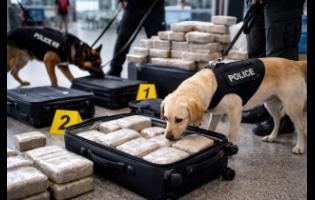Former cruise ship workers reflect on virus outbreak
Verol 'Bird' Reid remembers March 28, 2020, as if it were yesterday. An assistant bar manager, Reid was on a cruise ship that was sailing from San Juan, Puerto Rico to Miami, Florida, when he learnt of the COVID-19 pandemic.
"We were called to a meeting on the deck, and there we were given a history lesson that included information on the Spanish Flu," Reid, a 24-year cruise veteran, told THE STAR.
The World Health Organization declared the novel coronavirus (COVID-19) outbreak a global pandemic on March 11, 2020. Shortly thereafter, many cruise lines suspended their operations and governments, in an attempt to limit the spread of the virus, closed their ports.
CHANGE IN ATMOSPHERE
Bird said that the day the company's spokesman broke the news about COVID-19, the world stood still for a moment.
"The atmosphere was the regular," he said of the moments leading to the announcement. "People sitting on the deck having drinks and generally relaxing. After the announcement some people started cussing, and men and women cried and requested being sent home. We were told no port would accept us. We just had to be in the lockdown, scared and lonely," Bird said.
"It is among the worse experience of my life," Bird said.
Cruise lines have not ventured to sea since the pandemic. The US Center for Disease Control (CDC) has signal that it will be giving the all clear for cruise lines to operate, if passengers and crew are fully vaccinated against COVID-19. Tourism Minister Ed Bartlett said that the reopening of the cruise industry is likely to take place by June, and Jamaica is anticipating 570,000 cruise ship visitors this year.
Adrian Dell, a musician, who was forced off the high seas by COVID-19, can't wait to return. He was aboard a vessel entertaining passengers as part of Temperature Band when the pandemic forced the CDC to issue a no-sail order for cruise shipping in American waters.
"I enjoyed the eight months I was on board until COVID-19 changed it all," said Dell, who described the period of lockdown in their rooms on the ship as "terrible".
PREGNANT ON BOARD
Keisha Senior, a bartender from Green Island in Hanover, also endured a fearful period at the start of the pandemic.
"I was pregnant and I didn't want anything to affect my baby. I prayed and read my Bible everyday," said Senior, who was five months along when the pandemic was declared.
The displaced cruise worker said that she felt safe while on the ship, but was looking forward to coming home. However, the Jamaican Government had not given clearance for ships to enter the country's harbour. Senior was on a ship that was heading towards Jamaica, but had to turn back after authorisation was not given for it to dock. She was to spend a few more days at sea before finally coming home.
"When I finally reached home the Ministry of Health people took away my son because only one bathroom was on the house, and they didn't want to expose him to the virus. After three days I got mad and went for my son," she said.
The displaced ship workers said that they did not benefit from the government's COVID-19 Allocation of Resources for Employees Programme. The temporary cash-transfer programme to individuals and businesses was implemented at a cost of $10 billion. Some 435,000 Jamaicans reportedly benefited from the programme up to December last year. Another $300,000 is yet to be collected.
Senior has turned her attention to farming.
"I have gone into planting of short term crops. They won't be seeing me back on the ship. My decision is to stay home and take care of my seven-month-old daughter," she said.
As for Bird, he plans to return to the seas as soon as sailing resumes. For now, he is relying on a truck that he recently purchased to provide him with regular income.





































